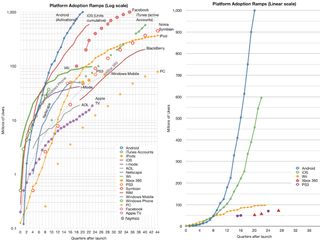Why the iPhone, iPad, Apple TV, and AirPlay are killing dedicated gaming devices

The intersection of people who love mobile and who love gaming is significant enough to have generated a ton of commentary surrounding the idea that traditional, dedicated gaming devices will be cannibalized by the likes of the iPhone, iPad, Apple TV, and AirPlay. Horace Dediu had a couple of interesting posts on the subject this weekend. In Third to a Billion, which included the above graphic, Dediu plots which platforms have reached a billion users and how long it took each to do so. From Asymco:
Android is the third platform to reach a billion users[1] . The first was Windows and the second was Facebook. Apple sold around 650 to 700 million iOS and is expected to be the fourth to a billion sometime next year.[2]
He notes Android is based on activations, but should correlate to users, that Windows took more than 10 years to reach the number, that both social (Facebook) and mobile (Android and iOS) have been much faster, and that iTunes accounts aren't curving off, at least not yet. What this shows, relative to mobile's impact on gaming, is the subject of a second post, Game Over. Asymco
That is where mobile is the clear winner. More people will hire mobile devices for their primary gaming activity. And as mobile devices get inexorably better, they will be hired for use in the setting where consoles have been king: the living room.The implications are that Nintendo, Sony and Microsoft are beyond the point of no return in this industry. Gaming, as a business, cannot be sustained as a platform independent of a general purpose computer. Like other "applications" that used to have systems built around them conforming to their needs[3] the dedicated-purpose solutions came to be absorbed into the general-purpose platforms. And the modern general purpose computer is the smartphone.[4]
There he notes that dedicated word processors, calculators, video editing boxes, music players, etc. faced the same challenge, and were reduced to niche status or subsumed entirely. PCs, on the other hand, couldn't do to gaming what mobile could because they were neither extremely portable for on the go, nor projectable for the living room. iPhone and AirPlay are.
As mobile devices get more powerful, and projection technology gets even better, the pressure on dedicated gaming devices increases. We've seen that story play out before. Sony a least produces mobile devices of their own, though their efforts to tie in real PSP-level gaming into their Android handsets have been kludgy at best. Microsoft, now buying Nokia, is positioned to do likewise but they've failed to even attempt to launch an Xbox portable and Windows Phone gaming has lagged a generation behind where it should be. Nintendo knows both console and portable, but has no experience in general purpose computing.
Apple and Google, meanwhile have shown no signs of "getting" gaming but managed to fall ass-backwards into their growing mobile gaming dominance. That shouldn't give game platforms hope. That should scare the hell out of them.
Master your iPhone in minutes
iMore offers spot-on advice and guidance from our team of experts, with decades of Apple device experience to lean on. Learn more with iMore!

Rene Ritchie is one of the most respected Apple analysts in the business, reaching a combined audience of over 40 million readers a month. His YouTube channel, Vector, has over 90 thousand subscribers and 14 million views and his podcasts, including Debug, have been downloaded over 20 million times. He also regularly co-hosts MacBreak Weekly for the TWiT network and co-hosted CES Live! and Talk Mobile. Based in Montreal, Rene is a former director of product marketing, web developer, and graphic designer. He's authored several books and appeared on numerous television and radio segments to discuss Apple and the technology industry. When not working, he likes to cook, grapple, and spend time with his friends and family.
Most Popular





